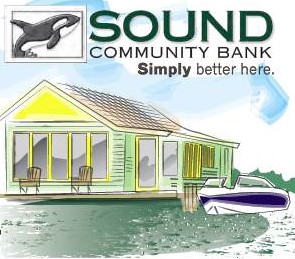Useful Apps
- Sign up for AlertSeattle, the city’s emergency alert system that delivers texts, emails, and voice calls about power outages, missed garbage pickups, and water service issues.
- In the event that the city needs to come out and fix something (fallen tree, pot holes in the road) use the city’s Find it, Fix it app to report the problem.
Before the Bad Weather Arrives
- Regularly inspect and clean out roofs, gutters, and downspouts.
- Inspect roof drains on flat roofs (scuppers) for clogs and proper drainage.
- Check for leaks around flashing, roof jacks, air, and sewer vents.
- Regularly inspect flotation systems and complete repairs proactively.
- A certified dive inspection team should inspect floats every three to five years.
- Concrete floats should have water alarms, and maybe bilge pumps with battery-powered backups.
- Inspect siding annually for evidence of water intrusion and complete repairs proactively.
- Check windows for leaks, broken putty, and cracked wood.
- Inspect the steel plates/bolts in your float that attach you to the dock. Scrape and paint rusty bolts.
- Add caulk and weatherstripping to doors and windows, and caulk around pipes entering the house as needed.
- Ensure there’s enough insulation in the outside walls and roof.
- Insulate water lines running along exterior walls and in unheated areas like the garage, basement, and crawl space.
- Ensure each houseboat on the dock has an easy-to-locate water shut-off valve and that other homeowners know how to find it.
- Ensure your floating home is level and your waste line is adequately sloped to prevent freezing.
- Remove and drain hose pipes, then insulate outdoor spigots with faucet covers.
- Insulate pipes above the waterline, including condensate drainage pipes from high-efficiency furnaces.
- Apply heat tape to water lines if required.
- Pipes are more likely to freeze when outdoor temperatures fall below 20 degrees. You can help prevent waterlines along exterior walls from freezing by opening the cabinet doors beneath bathroom and kitchen sinks.
- Locate the interior faucet furthest from your front door or the water shutoff valve and allow it to dribble cold water continuously.
- Have your fireplace, chimney, and flue professionally inspected.
- Test all smoke and carbon monoxide alarms and ensure backup batteries are working.
- Set your furnace thermostat to no lower than 55 degrees, even if you’re leaving the house.
- Keep doors and windows covered and close off unused rooms to conserve heat.
- Minimize the use of kitchen and bath exhaust fans.
- Portable electric heaters suitable for marine use should be used, and ensure they do not overload electrical circuits.
- Ensure you know where the main water, electricity, and gas shutoffs are.
- Buy and store de-icer, rock salt, sand, and heavy-duty snow shovels.
- Keep a small supply of tinned/dried food on hand until you can get to Pete’s.
- Gather blankets, sleeping bags, and cold-weather clothing.
- Purchase solar-powered lights and battery chargers.
- Keep plenty of batteries and flashlights.
- Check or replace smoke detector batteries annually.
- If you park your car outside, lift the windshield wipers away from the screen or cover it to avoid ice and snow buildup.
- Alert your neighbors on your dock using whatever messaging system you have in place to remind people to turn on taps when the temperature is going to drop.
When the Bad Weather Event Happens
- Check for wind damage, frozen pipes, and any water, electricity, or heat loss.
- If water does not come out when you turn the tap on, and you suspect the pipe has frozen (which will typically happen where a pipe runs along an outside wall or enters the home, or goes around a bend), close the main shutoff valve to prevent flooding and call a plumber for repair or replacement right away. Check out our Floating Home Services page if you need a diver.
- While you wait for the diver, you can position a hair dryer to blow on the affected pipe for an hour or so (assuming it is safe to do so). Another thing that will help is pouring buckets of lake water over the frozen pipe.
- If you lose power, keep refrigerators and freezers closed to preserve your food supply as long as possible.
- Never turn on a gas stove to generate heat or use any gas, charcoal, or propane devices to heat your home or cook meals indoors. And don’t use a portable generator inside the house or in a garage or carport. They should be placed at least 20 feet away from the house and protected from rain and snow.
- If there is snow, clear ice-covered sidewalks, porches, steps, and driveways using sand, rock salt, or another de-icing product and shoveling. Seattle’s municipal code states homeowners are responsible for maintaining clear sidewalks abutting their property.
- If there is a significant accumulation of snow on your roof, and it is safe to get up there, shovel it off. Especially if you are on a log float, to avoid tippage.
- Report potholes, fallen trees, flooding, etc, to the city using Find it, Fix it.


